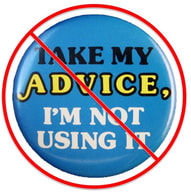 by JD Hancock (modified)
by JD Hancock (modified) Why? Together, we support a follow-up group from a men’s weekend. It’s a forum for heart-oriented sharing, in contrast to the typical figuring-it-out and giving advice.
But instead of redirecting advice, this usually brilliant man was giving more!
But what to do instead? Here are three alternatives.
Simply Be Present: “You’re Seen and Celebrated"
- Listening (without trying to form a response)
- Mirroring (pausing to check that you’re tracking by paraphrasing and checking for accuracy)
- Validation (not agreeing, but putting yourself in the person’s place and showing that you understand how this experience makes sense for them)
When we struggle, there’s often something inside we haven’t realized because of our own self-judgment. So a space of acceptance, blessed with curiosity, generates insight. Because it’s an internal discovery, it makes you feel resourceful too.
Invite Emotional Protein
When we gain a deeper understanding of what’s going on, we see it isn’t simply laziness or moral failure behind hard challenges. We learn that the behaviors we seek to shift, even though they’re not working now, were almost always the best adaptation that we could manage at the time. They might even be a sign of something well-intended. Best of all: this deeper understanding nourishes self-compassion, which gives us more energy. Change requires that energy.
Share from the Heart, At Completion
Generally, you’ll want to make sure the person you’re supporting is “complete:”
they’ve gained insight and are at a good place to stop. Get permission: there’s something that touched you; would it be ok to share? Insure your sharing is rich around your own feelings and vulnerabilities. If it’s hard to speak without your voice catching or tears coming, share that! If, however, it has the energy of showing how advanced you are, DON’T.


 RSS Feed
RSS Feed
